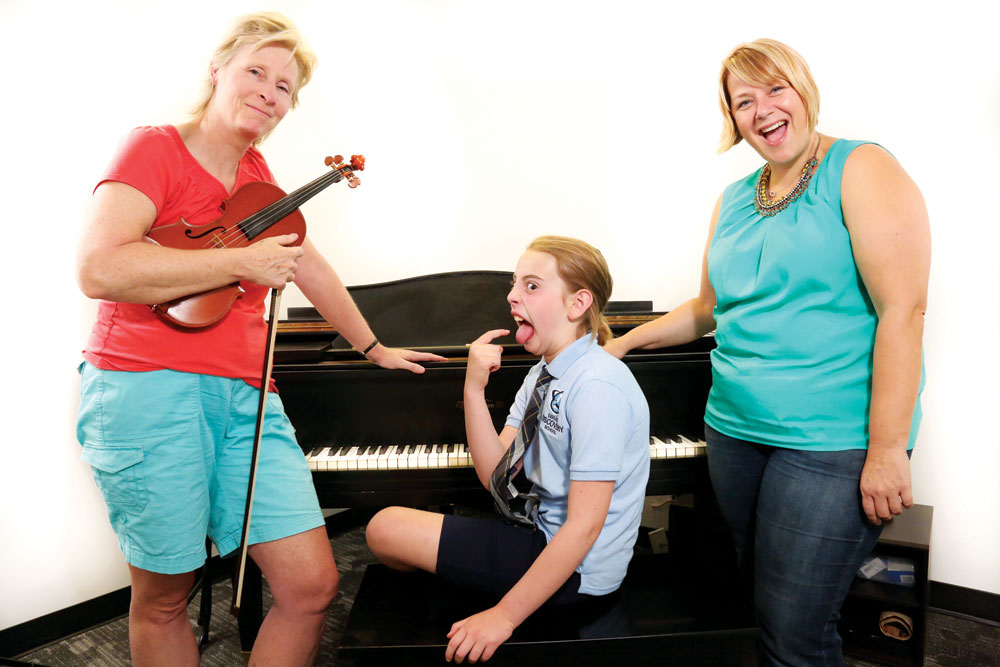
Zohar Heiman theatrically portrays a child who won’t practice. Josie Quick, violin teacher (left) and Skye Barker Maa, executive director of Neighborhood Music Stapleton (right), suggest techniques to keep kids interested.
Those in the business of teaching music say it provides practical benefits for learners. But what if parents invest in music lessons and their children simply don’t want to stick with it? “Even if they stick with it for only six months, it’s still a benefit because they learned to open up their creative brain,” says Josie Quick, a violin teacher and Park Hill resident.
She has had a Park Hill business teaching violin for 25 years and says exposure to music and arts connects the creative brain to the logical brain. “The creative side helps us solve problems. If the creative brain isn’t working, we’re stuck doing things the same old way.”
Skye Barker Maa, executive director of Neighborhood Music Stapleton, says it’s easy to find studies linking musical training with success in life. “There are books about world leaders who studied music when they were young. Others say it’s not the music but the parental engagement. Does music make kids smarter? I think music is a tool that teaches kids how to think because it uses so much of the brain.”
 Quick and Barker Maa both think parents can do a lot to help their kids hang in there for at least six months. “Parents should know that most kids start with a lot of motivation, but the bloom falls off the rose at about three months, when they realize how much work is required,” said Quick. “I tell parents to make a commitment to one year, or six months at least, to get past the three-month slump. When a school year has passed, they can play songs and they have the self-esteem that comes from accomplishing that.”
Quick and Barker Maa both think parents can do a lot to help their kids hang in there for at least six months. “Parents should know that most kids start with a lot of motivation, but the bloom falls off the rose at about three months, when they realize how much work is required,” said Quick. “I tell parents to make a commitment to one year, or six months at least, to get past the three-month slump. When a school year has passed, they can play songs and they have the self-esteem that comes from accomplishing that.”
Tips to help kids stay interested
- Parent’s commitment: “Parents need to be fully at the table to push through the hurdles,” said Barker Maa. “Kids’ days are busy and demanding with school, sports and other activities. It’s important to make music part of the routine, consistent every day.”
- Encouragement: “Kids need acknowledgment,” said Quick. “It irks me when a parent sits in on a lesson with her face in her phone, and doesn’t even look up when the child plays well. Kids look to their parents for encouragement and approval, a ‘Did you see that?’ moment. Tell them when they sound good.”
- Practice: How much practice is required? “I don’t set a specific amount of time to practice,” Quick said. “The old 30-minutes-a-day thing doesn’t work if you’re playing Twinkle, Twinkle, Little Star 1,500 times. No wonder kids (and parents) get sick of it. The important thing is to pick up the instrument every day. I tell kids to play their lesson five times well, which teaches them to be self-motivated and self-critical.”
- Setting goals: Barker Maa said constant goals keep kids motivated. “This fall we’ll do a haunted house with music and we’ll have four of our rock bands in the Stapleton Rocks event on September 11. We’re doing a winter musical and a recital at Denver School of the Arts. Having these opportunities to work toward keeps it interesting and keeps students moving forward.”
- Motivation: Neighborhood Music, which expects to have 350 students this fall, aims to feed music to kids in different ways, including ensembles and technology. “Our seven bands are like teams: your peers motivate you to practice. Technology also helps expand students’ experiences, like our composition for video games class. They are learning music theory and paying attention because it’s something they enjoy.”
- Technology: Bringing technology into lessons helps, Barker Maa said. “Teachers use iPads to explain concepts. We record ensembles on GarageBand, listen to it right there, and walk through it to see where we need improvement. Some we put on YouTube. We embrace technology and it helps us speak to the tech generation.”
Still, music lessons aren’t for everyone. “Everyone takes to the arts in some way and if it’s not music maybe it’s painting, writing, or being a backstage technical person,” said Barker Maa.
“I ask them, ‘What do you like to do?’” said Quick. “I’ve had students who switched to writing or dance. As long as they have an activity to build on, it helps their self-esteem. The most valuable thing is accomplishing something weekly.”
Want to find a music teacher? See the Front Porch Guide to NE Denver Music and Arts Teachers.



0 Comments